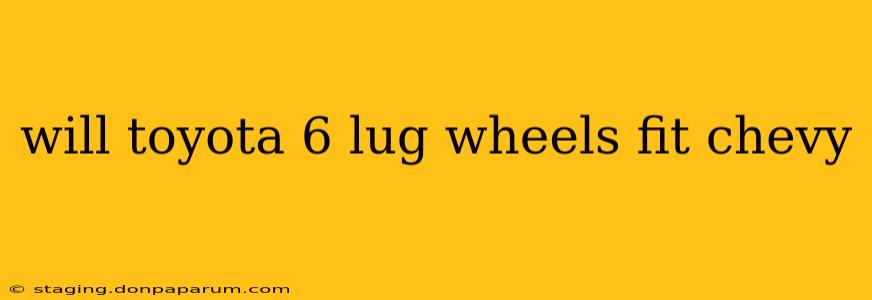Will Toyota 6-Lug Wheels Fit a Chevy? A Comprehensive Guide to Wheel Compatibility
The question of whether Toyota 6-lug wheels will fit a Chevy is a common one, and the short answer is: maybe. While both brands utilize 6-lug patterns, the critical dimensions determining compatibility go far beyond just the number of lug nuts. This guide delves into the specifics, helping you determine if a swap is feasible for your vehicle.
Understanding the Key Factors for Wheel Compatibility
Several crucial factors determine if a wheel will fit your vehicle safely and correctly. Ignoring these can lead to dangerous situations, including wheel wobble, vibrations, and even wheel detachment. Let's examine these key elements:
-
Bolt Pattern (PCD): This refers to the diameter of the circle formed by the centers of the lug bolt holes and the number of bolts. While both Toyota and Chevy vehicles frequently use a 6-lug pattern, the diameter of that circle can vary significantly between models and years. For example, a Toyota Tacoma might have a different PCD than a Chevy Silverado. You MUST verify the exact bolt pattern for both your Chevy and the Toyota wheels.
-
Wheel Offset: This measurement indicates the distance between the wheel's mounting surface and its centerline. A positive offset means the mounting surface is closer to the outside of the wheel, while a negative offset brings it closer to the inside. Incorrect offset can cause rubbing against the suspension, brakes, or bodywork. Matching the offset is crucial for a safe and proper fit.
-
Center Bore: This is the diameter of the central hole in the wheel that fits over the vehicle's hub. If the center bore of the Toyota wheel is too small for your Chevy's hub, it won't fit. Conversely, if it's too large, you'll need hub-centric rings to ensure a secure and precise fit. Ensure the center bore diameter is compatible or that you have the correct hub-centric rings.
-
Wheel Stud Length: While less frequently a problem, the length of your Chevy's wheel studs needs to be sufficient to securely fasten the Toyota wheel. If they're too short, the lug nuts won't engage properly.
-
Wheel Diameter and Width: While not directly impacting fitment in the same way as the other factors, the diameter (e.g., 17", 18") and width of the wheel need to be compatible with your vehicle's specifications and clearances. Too large a wheel might rub, and too small a wheel may not offer adequate braking performance.
How to Find the Necessary Wheel Specifications
Finding the correct specifications for your Chevy and the Toyota wheels is vital. You can usually find this information in a few places:
- Vehicle Owner's Manual: Your Chevy's owner's manual should list the recommended wheel specifications.
- Wheel Manufacturer's Information: The Toyota wheel itself (often stamped on the back) or the manufacturer's website may provide the necessary dimensions.
- Online Wheel Databases: Several online databases allow you to search for wheel specifications based on vehicle make, model, and year.
Caution: Safety First!
Incorrectly fitted wheels are a serious safety hazard. Never attempt to install wheels without verifying their compatibility with your vehicle. If you're unsure, consult a qualified mechanic or tire professional. They possess the expertise to determine if the wheels are suitable and can safely install them. Improper fitment can lead to accidents, so err on the side of caution.
This guide provides a comprehensive overview, but always remember to prioritize safety and verify the compatibility of all dimensions before attempting a wheel swap.

